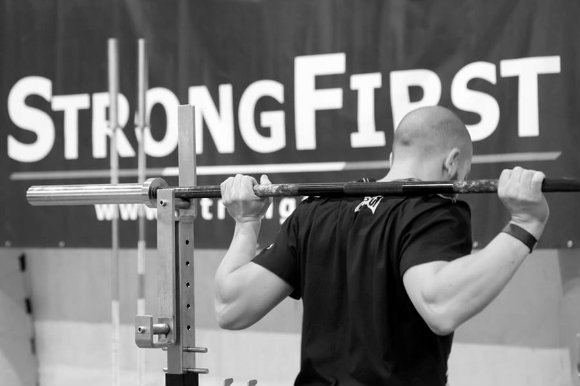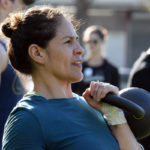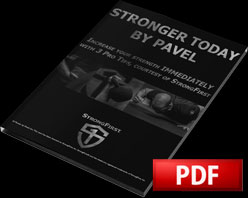“How?” That’s probably the question I hate most in the strength industry. The truth is this: I have no idea how getting stronger helps performance. I have no idea how getting strong helps women lean out. I have no idea how anything, really, in the body works. And, it doesn’t matter.
The fact is getting stronger gets you closer to almost every goal I know. I was going to have a clever little point here about the single exception I could think, but I couldn’t even think of one.
How You Get Strong: Maybe It’s Magic
How one gets stronger doesn’t matter. I’m reminded of J.R.R. Tolkien’s great insight about the words “Celt” and “Celtic.” In case you don’t know, it should represent a great people (pronounced correctly as “kelt,” by the way) but it has morphed in fairy dust, wearing green pants, and singing dirges. Of course, this is all fine, too, as I sing best in green pants. Tolkien noted:
“’Celtic’ of any sort is…a magic bag, into which anything may be put, and out of which almost anything may come… Anything is possible in the Celtic Twilight.”
How getting stronger works is just like this magic bag. Which reminds me of the hand shaking my professor used in 1978 about how Adam Smith’s “Invisible Hand” worked in economics. My favorite part of the series, Free to Choose with the economist Milton Friedman, was his wonderful explanation that no single person can make a pencil. A huge number of people, acting in their individual interest, collaborate to make and sell you a pencil. Literally, for you to make a pencil by yourself (well made), the cost would be astronomical compared to simply buying one at any corner store.
So, too, with us in the strength world: I hold a magic bag that takes your goals and I mix them with appropriate strength movements and I wave the dust back upon you. And, like all good magic, you are transformed and you get to where you need to be. Like the ruby slippers (actually silver shoes in the original) of The Wizard of Oz, you just need to tap yourself for three sets of three reps with a reasonable load and all your dreams come true.
But, this gets us back to this annoying question about “how” it works. It reminds me of what we were told at the Olympic Training Center concerning training the mind. If the brain were simple enough for you to understand it, you would be so simple that you wouldn’t care. I am convinced we get stronger in two steps, but I am more than willing to be wrong.
Step 1: Strength Is a Skill
Step one is why you hired me. Strength can be learned. There are tricks to lifting more weight and they are as simple as the learning tension and relaxation, learning to wedge under a load, learning to grease the groove, and learning that real strength is something that is a practice, not a single workout. In other words, step one is “learning” to be strong. It takes a while to learn all the great movements and, yet, an advanced lifter can become “instantly” stronger by learning this cue or that tension.
“Instantly” is a funny term. As my friend, Charles Staley, told me years ago that saying “instantly add an inch to your arm in two weeks” sells much better than the same phrase without “instantly.” For those of us who have experienced that “aha” moment where you failed doing something several times, then were told a new cue and succeeded, “instantly” is as close to the magic bag as anything you will experience in life.
Step 2: The Cascade
Step two is where the real fun begins. Robb Wolf, the great nutritionist and expert in the Paleo diet, always tells me about this wonderful “cascade” that happens to the human body when we set things up right. Thus, step two might simply be called the “Hormonal Cascade.” Now, feel free to drop the hormone part here as I am sure it is much more subtle and complex at the same time. I’ve seen several times in my experience.
The best example is when I met Dick Notmeyer. I had been training with weights for a long time and I was very strong. As a high school senior, I was stronger than most men I have experienced in my lifetime. I weighed 162 pounds and I was a bench pressing machine. When I met Dick, he insisted on five days a week of training. Three days of the two Olympic lifts and two days of front squats and jerks. I had never gone deep in the squat and I had certainly never pulled this often. Four months later, I weighed 202 pounds. That’s forty pounds gained in four months, ten pounds a month and two and half pounds a week.
“How did this happen?” The math won’t work by the way. There is no way I could have consumed enough calories with the calories in-calories out model as I was training so hard, but still exploding in size. That’s the cascade. In my book Mass Made Simple, I offer a six-week training program with only fourteen workouts. Guys who do the program always report back that they make the best progress of their life.
I also get questions like this: “If it is so good, why don’t you keep doing it?” And, I laugh. Obviously, this person has never done the workouts that have pure strength moves, complexes, and staggeringly high-rep squats. You can only do it for six weeks. But, if you take it seriously, the body will reward you with a cascade.
Stop Worrying About the “How” and Just “Do”
So, when you decide to get stronger to support any other fitness goal don’t worry about the how. Correct strength training will get you on the right path. Master the movements and keep your reps, sets, and load reasonable and repeatable. Then, enjoy that wonderful gift when your body responds by cascading the hormones and all the whatevers that will make you bigger, leaner, stronger, faster and abler.
Don’t focus on the how. Focus on the do.







Its like you read my mind! You appear to know so much about this, like you wrote the book in it or something. I think that you could do with a few pics to drive the message home a little bit, but instead of that, this is magnificent blog. An excellent read. I will definitely be back.
Step 2 is so appropriately stated! “…this wonderful “cascade” that happens to the human body when we set things up right.”
I feel like I spend hours thinking this and not saying this with clients, and maybe I should reverse that.
Thank you for this excellent post, Dan.
DO or DO Not. There is no Try. -Yoda
Bout sums it up!
Just love that Yoda quote!